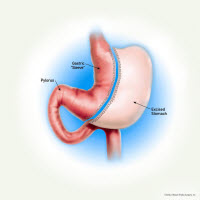What is a sleeve gastrectomy, and how does it help with weight loss?
A sleeve gastrectomy is a newer weight-loss procedure that is gaining popularity among patients and bariatric surgeons. It offers an excellent alternative to both the gastric bypass and the adjustable gastric banding. During the surgery a small “sleeve-shaped” stomach is created from the original stomach. Approximately 75 percent of the “stretchy” portion of the stomach is removed. This also removes the portion of the stomach that makes the hormone ghrelin, which tends to make you feel hungry. The remaining “sleeve” of the stomach is about the size and shape of a medium banana.
The procedure has proven effective for two major reasons. First, you have a much smaller stomach and will feel full after eating only a small amount. Second, there is a decrease in the hormone ghrelin so that hunger is much better controlled.
Who is a candidate for this procedure?
As a general rule, if you are a candidate for any weight-loss procedure, you are also a candidate for a sleeve gastrectomy. The accepted indications for weight-loss surgery are having a body mass index (BMI) greater than 40 (usually 100 pounds overweight) or a BMI of 35 to 40 with associated medical problems such as diabetes mellitus, hypertension, high cholesterol or sleep apnea. In the future people with even less to lose may qualify for the sleeve gastrectomy since the long-term risk of the procedure is so low.
What are the risks with this procedure?
There is risk associated with any operative procedure. Death is exceedingly rare but not impossible. A leak from the staple line of the newly formed stomach pouch can occur approximately one to two percent of the time, resulting in infection and the possible need for further surgery. Potentially a stricture (or narrowing) could occur that might cause a partial obstruction. Other less common problems include blood clots or other infections.
What are the benefits of sleeve gastrectomy in comparison to the adjustable gastric band or gastric bypass?
One of the advantages of the sleeve gastrectomy is that there is no implanted mechanical device that requires adjusting or might develop problems long-term and require removal at some point. In comparison to a gastric bypass, the sleeve gastrectomy has no intestine bypassed so there is little chance of developing nutritional deficiencies due to malabsorption. With a sleeve gastrectomy, the anatomy remains completely normal; the stomach is just much smaller. In addition, recovery from this surgery is remarkably quick. Most people are in the hospital overnight and within two to three weeks are able to resume completely normal activity.
Does insurance cover the sleeve gastrectomy?
At this point many insurances still do not cover sleeve gastrectomies, but that will likely change over the next few years. However, the sleeve gastrectomy tends to be one of the lower priced procedures if you are paying for it yourself.
What can I expect for weight loss and improvement of other medical problems?
Weight loss after a sleeve gastrectomy tends to be faster than with an adjustable gastric band, and most people will lose an average of 65 percent of their excess weight within about a year. Medical problems typically improve as weight is lost. With this level of weight loss, diabetes will improve or resolve more than 90 percent of the time. High blood pressure, cholesterol/triglyceride problems and sleep apnea improve or resolve between 50 and 85 percent of the time.
How do I get the most from a surgical weight-loss procedure?
Keeping weight off long-term is difficult. The surgical weight-loss procedures are tools to help you lose weight, improve your health and keep the weight off long-term. Education is important in using this “tool” effectively to lose weight and keep it off. Any surgical weight-loss program needs to include nutrition, behavior modification and exercise. Ignoring any of these aspects can lead to poor weight loss and regaining weight.
I like to tell my surgical patients that surgery is only an extension of a medical weight-loss plan. It will only work temporarily if you don’t embrace a total lifestyle change.
What if I don’t have the insurance benefit?
At Dr. Clark’s Center for Weight Loss Success, we are making weight loss surgery in Virginia more effective and affordable just for you—even if you have no insurance coverage or you are frustrated with insurance processing requirements.
Is this the right decision for me?
Weight loss surgery is a personal decision and one that you need to discuss with an expert like Dr. Thomas W. Clark. Having performed almost 4,000 weight loss procedures, Dr. Clark is one of the most experienced bariatric surgeons in North America. He will clearly review the options to determine what surgery may be best for you. Because he is one of an elite few bariatric surgeons who is also board certified in bariatric medicine, he will follow your weight loss closely and provide all of the services necessary to not only lose weight but keep it off for good.
Weight loss surgery is one of many tools we use to help you lose weight. At Dr. Clark’s Center for Weight Loss Success we are not only committed to the highest quality surgical care, but also to your long term success. As a result, our comprehensive program is second to none in the nation and includes our exclusive Weight Management University for Weight Loss Surgery™ step-by-step pre-op and post-op educational program, habit modification classes (on-site or online) and fitness in a state-of-the-art facility that caters to people just like you.
Ours is the most comprehensive weight loss program available anywhere. Because we believe so strongly that bariatric surgery in Virginia should be affordable, the Center for Weight Loss Success has the most competitive prices around. This, coupled with Dr. Clark’s expertise, makes the weight loss surgery options at the Center for Weight Loss Success your prescription for long term weight loss success.
Have more questions? Dr. Clark has put together a series of Free webinars to answer the ‘Top 21 Questions You Need to Ask About Weight Loss Surgery’.

